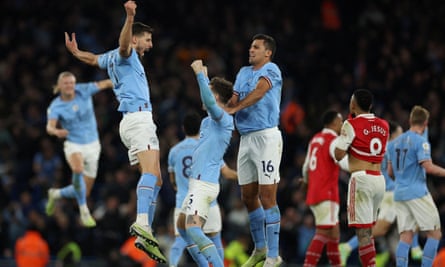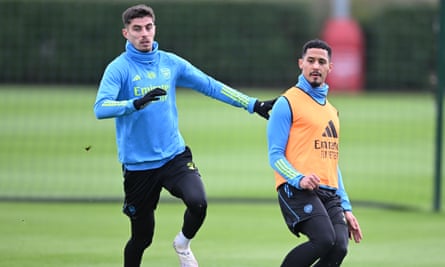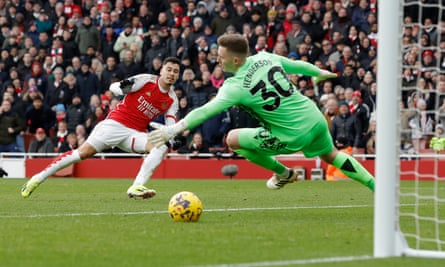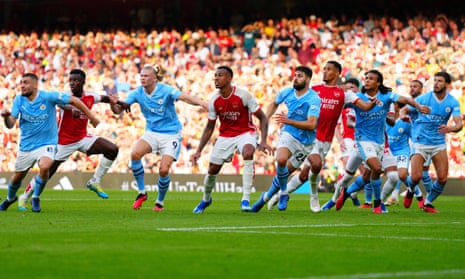The Premier League has always sold itself as a piece of cinema, a big-budget epic, an action franchise, a landscape of superheroes and supervillains. It makes for persuasive packaging, even if the reality has often been more prosaic, dominated by remakes and familiar star turns, Pep Guardiola’s Mission Entirely Probable Volume 8.
It still seems startling that 10 years have passed since the world’s most powerful league staged a three-way title race as close as the current season’s. But this one really does seem to be narrowing towards an actual blockbuster ending.
Hence perhaps the unusual degree of excitement around Arsenal, Liverpool and Manchester City’s clustering together at the top of the table, the hunger to see each beat in the story as a potential moment of resolution, the final car chase, the decisive rooftop punch-up.
The last title decider, Liverpool versus City three weeks ago at Anfield, ended in a fun 1-1 draw that everyone already seems to have forgotten about. The latest title decider, Arsenal’s trip to the Etihad on Sunday afternoon does seem to have more in the way of decisive edge. At the very least this feels like a pre-ending, a bridging sequence, the untangling of a final plot point.
Not so much for City, who have taken the season to the wire before, who will feel they can go into that place again and still feel good about it. But more so for Arsenal, who have no recent muscle memory of winning things, who have the pressure of being on all of the key numbers – goals, points, defence – the best team in the league to date, and who might feel that this is a chance to be taken, that this is really their game.
The fixture list plays a role. Seven of City’s 10 remaining games look, ceteris paribus, like the kind they usually walk right through: West Ham, Wolves and Luton at home; Fulham, Nottingham Forest, Brighton and Crystal Palace away.
Arsenal have a slightly tougher run-in, with Manchester United away and some added north London derby jeopardy. Logic and precedent suggest someone will have to take points off City to prevent the default champions making it four in a row. The best equipped team to do that is Arsenal themselves. A draw would be fine. But there is a fair case that they actually need to win on Sunday.

This would involve the additional fascination of doing something new. Arsenal have a good away record. What they lack are “statement” away wins. The last big Premier League away win was Newcastle in May. This season’s best away results have been victory in Seville and a draw at Anfield.
It is an omission Arteta will be keen to address, most notably when it comes to his own genuinely terrible record at his old place of work. Five trips to the Etihad as Arsenal manager have brought five defeats (scores: 3-0, 1-0, 5-0, 1-0 and 4-1). No member of the current squad has scored a goal for Arsenal at the Etihad, the last of them an 86th-minute Rob Holding consolation in a game that basically ended his time at the club. This would be an ideal moment to subvert the dominant paradigm.
How, though? The key ingredient is intensity of method rather than some wrongfooting tactical shift. Arsenal are unlikely to spring surprises. The gameplan on their best days is to be Arsenal, just more so, with the conviction the strongest parts of this team, the patterns that continually put their best players in the best attacking positions, the movement and pressing in and out of possession, will eventually tell. This was key to Arsenal’s win at the Emirates over City in October, a day when they simply sucked all the air out of the game and found a break in the stitching late on.

The approach will be to do more not less of this as the season narrows. When Arteta spoke about the need for champion players to keep producing the same high-intensity game every three days even when their tendons are twanging he was thinking of periods such as these.
after newsletter promotion
International toddling-about aside, Arsenal haven’t played a game for 17 days. This is the second period of rest for these players since Christmas. They are a younger team than City, who basically have three main players under the age of 28, while Arsenal have William Saliba, Ben White, Gabriel, Bukayo Saka, Martin Ødegaard, Gabriel Martinelli, Kai Havertz and Declan Rice all 26 and under. This group won’t get a better chance to impose their own super strengths.
There are other details. Erling Haaland is a significant presence for both teams. Recent weeks have suggested nullifying City’s cutting edge is key to containing this iteration. Very good one-to-one defenders have managed to restrict Haaland’s movements in the spaces where he scores goals, and in the process effectively remove one City player from the pitch, given the limited range of his game.

Haaland has been off colour by his standards, with goals in three of his past 10 Premier League games. And despite the mind-boggling overall numbers he also has things still to do. The iconography of Haaland is big goals at big times. It hasn’t quite been like that. Last season he didn’t score a decisive goal against a major opponent in the season’s run-in. He has one goal in open play in the first half of a league game since 21 October.
The noises off about five goals at Luton, flat-track bully, hammer of the minnows and so on are absurd given his contribution aged 22 to a treble-winning season. Tougher games are simply tougher. Everyone has less individual influence. But this would be the ideal moment to restate his value; or alternatively for Arsenal to sustain that run.
Otherwise Martinelli also feels like a key part on Sunday, fitness permitting. This is an attacking player whose influence goes beyond the basic numbers. Martinelli’s ability to run at startling speed with the ball, to skate along on that left flank as a kind of outrider, an advance guard, always ready for the swift transition, gives Arsenal a lurking sense of threat in every other part of the pitch.
Still, though, deciders are very rarely actual deciders; not with eight games still to go until the final Super Sunday. But this does feel like a moment for the season to enter its final act; and a moment that is perhaps more vital for Arsenal in the struggle to establish their own main character energy.
